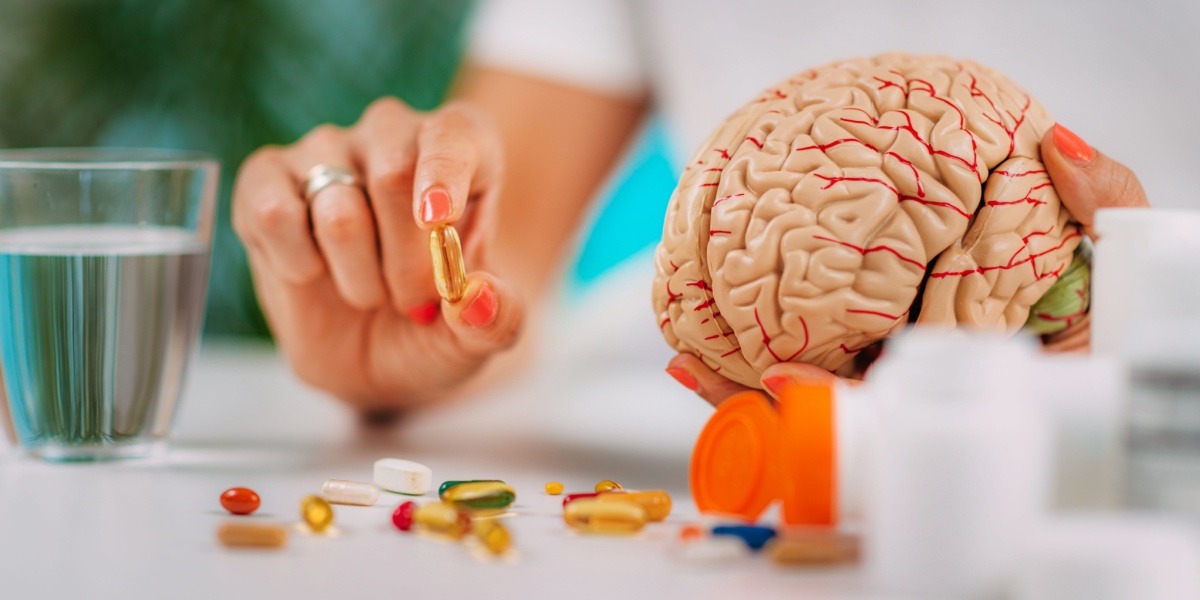Nootropics, also known as “smart drugs,” are substances used to enhance mental performance. They range from supplements and herbs to prescription drugs, all claiming to boost memory, focus, or other cognitive functions. As interest in cognitive enhancement grows, it’s essential to understand what nootropics are, how they work, and what science says about their benefits and risks.
- Nootropics are natural or synthetic compounds that improve cognitive functions like memory, attention, and learning. Unlike stimulants, true nootropics aim to enhance brain function without significant side effects or addiction.
- Some nootropics (e.g., Bacopa monnieri, Rhodiola rosea) show modest improvements in cognitive tests, but results are mixed and often inconsistent across studies. Many “brain-boosting” claims lack solid clinical evidence, especially when used by healthy people.
- Most nootropics have relatively mild side effects and low toxicity. However, dietary supplement nootropics are largely unregulated – some products have been found adulterated with unapproved drugs.

What are nootropics?
Nootropics are a heterogeneous group of substances purported to enhance cognitive functions such as memory, learning, focus, and mental clarity. [1] The term “nootropic” was coined in the 1970s by psychologist Corneliu Giurgea, who outlined that such substances should boost brain power while being extremely safe.
Traditionally, the prototype nootropic is piracetam, a substance related to the neurotransmitter GABA that was developed to improve learning and memory without sedative or stimulant effects. Today, the definition is broader: it includes natural nootropics (herbal extracts, vitamins, etc.) and synthetic nootropics (lab-made compounds) that might enhance mental performance. [2]
In essence, nootropics are often thought of as cognitive enhancers that come with neuroprotective benefits and minimal toxicity. [2]
Are nootropics stimulants?
Not exactly. While stimulants like caffeine or amphetamines do enhance alertness and attention, they are not typically considered “true” nootropics due to their side effects and abuse potential. In addition, many stimulants are restricted by federal regulations, which makes them less accessible to the general public. Genuine nootropics are intended to work in more subtle ways without the jitteriness or dependency risk of classical stimulants.
For example, many nootropics do not directly flood the brain with neurotransmitters; instead, they may improve cerebral blood flow (increased blood to the brain), support neuron metabolism, or protect brain cells from oxidative stress. [1] This means nootropics generally lack the immediate jolt of a stimulant. [1]
By contrast, drugs like methylphenidate, Adderall, or modafinil, sometimes called cognitive enhancers, are powerful stimulants approved for ADHD or sleep disorders and require medical supervision. [2] In short, all stimulants that improve focus are cognitive enhancers, but not all cognitive enhancers meet the original nootropic criteria of being side-effect-free and neuroprotective.
Are they really "brain enhancers"?
Nootropics are often marketed as brain boosters, but the evidence for dramatic benefits is limited. No over-the-counter supplement has conclusively been shown to significantly enhance cognition in healthy adults. [2]
Many popular nootropics have yielded mixed research results. For instance, some trials have shown the herb Bacopa monnieri yielded slight improvements in memory recall and attention speed [3], but other studies found it has little to no cognitive benefits for healthy people. [4] Similarly, Rhodiola rosea is traditionally used to fight fatigue and “clear the mind.” Yet, clinical studies have been small and have several limitations – overall, there is scant reliable evidence that Rhodiola or most herbal supplements noticeably improve cognition. [5]
Nootropics are not magic “limitless” pills – any gains tend to be subtle and highly variable from person to person.
Effects of nootropics
Different nootropic compounds have different effects on the brain. For example:
- Bacopa monnieri (an Ayurvedic herb) has been reported to slightly improve memory acquisition and the speed of attention in chronic use. [3]
- L-theanine (an amino acid from green tea) promotes relaxation without drowsiness and may help focus, especially when combined with caffeine. [6]
- Rhodiola rosea (a traditional adaptogen) might reduce mental fatigue and help sustain performance under stress. One small study of night-shift doctors showed improved fatigue levels with Rhodiola. [5]
- On the synthetic side, racetam drugs like piracetam are designed to enhance learning and memory by modulating neurotransmission, without acting as stimulants. Another example is bromantane (developed in Russia), which has mild stimulant and anxiolytic properties. It has been used to increase physical and mental work capacity under fatigue. [7]
Responses can differ substantially from person to person. Some people report noticeable improvements in concentration or mental clarity with a given nootropic, while others feel no effect. Additionally, many nootropics require consistent use over time rather than a one-time dose. For instance, studies of Bacopa monnieri typically gave daily doses for 8–12 weeks before observing cognitive benefits, suggesting it works cumulatively rather than instantly.
This contrasts with true stimulants, which have acute, immediate effects. [3] Therefore, individuals who have experience taking both stimulant and non-stimulant nootropics might make comparisons as to the speed of their effects and look toward that as an indicator of their overall efficacy.
Long-term effects
The long-term effects of nootropic use are not well understood. To date, there is no convincing evidence that any nootropic can prevent age-related cognitive decline or dementia. For example, taking Bacopa or other supplements for years has not been shown to stop memory loss in aging – such trials either haven’t been done or have yielded negative results. On the other hand, available research indicates that most nootropics are low in toxicity and well tolerated with long-term use. [1]
Piracetam and similar compounds have been used in clinical settings for months or years without significant issues, and herbs like Bacopa have a long history of traditional use. Still, absence of evidence is not evidence of absence: we lack long-term, high-quality studies. Thus, while moderate use of popular nootropics appears safe, it remains unknown whether their actual long-term effects are positive or negative.
Nootropic uses
People turn to nootropics for various reasons.
As cognitive enhancers
The most common use is as cognitive enhancers for productivity – for example, college students during exams, professionals in high-demand jobs, or others who want to boost focus and memory. Surveys have found that many students use substances ranging from caffeine and Adderall to over-the-counter brain supplements in hopes of improving study performance. [1] Nootropic stacks (combinations) are popular in tech and entrepreneurial circles, aiming to enhance creativity or concentration.
Older adults sometimes use over-the-counter nootropics (like Ginkgo biloba or omega-3 fatty acids such as fish oil) in hopes of preserving memory, even though clinical support for memory improvement is limited.
In clinical settings, nootropics have been explored for recovering cognitive function after events like traumatic brain injury or stroke, and for mild cognitive impairment, but such uses remain experimental and part of clinical trials rather than standard care. [9]
As ADHD treatment
Another growing use is as a natural alternative for ADHD or other cognitive disorders. Some people experiment with nootropics to manage attention-deficit/hyperactivity disorder, hoping to avoid stimulant medications. For instance, preliminary studies suggest Bacopa monnieri may reduce inattention and impulsivity in children with ADHD. [7]
Likewise, the investigational drug fasoracetam (in the same class as piracetam) has been studied in adolescents with ADHD and certain genetic traits – early results showed improvements on ADHD symptom scales. [8] It’s crucial to emphasize that these are exploratory uses; no supplement or experimental nootropic is officially proven to treat ADHD, but research is ongoing in this area, given the demand for non-stimulant options.
As mood enhancers
Many nootropics are also used for general brain health and mood. Adaptogens like Rhodiola, Ashwagandha, or amino acids like L-theanine are taken to combat stress and anxiety, with the idea that a calmer, less fatigued mind will perform better cognitively. [1]
Are they safe?
For most people, nootropics have a favorable safety profile. In general, these substances tend to have mild, infrequent side effects. For example, the most common side effects of Bacopa monnieri are gastrointestinal (such as nausea or stomach cramps), and these occur in a minority of users. [7]
L-theanine (in tea) and Rhodiola are widely regarded as safe, with almost no serious side effects reported. Even synthetic nootropics like piracetam are noted for their low toxicity; serious adverse effects are rare. [1] That said, “mild side effects” can still be bothersome for some; headaches, insomnia, or upset stomach are occasionally reported with various nootropics (these are generally reversible by stopping the substance). [1]
One safety concern is that many nootropics are sold as dietary supplements, which means they are not as tightly regulated as prescription drugs. Product quality and ingredient purity can be an issue. The FDA and other investigators have found some so-called “nootropic” supplements spiked with pharmaceuticals or other undisclosed compounds. [2]
This adulteration can pose significant health risks. Consumers should stick to reputable brands and be wary of supplements that contain a long list of obscure ingredients or make extravagant claims. It’s also wise to avoid combining multiple nootropics or using them in excessive doses--more is not always better, and interactions between ingredients are often not studied.
Are nootropics legal?
The legality of nootropics depends on the specific substance and jurisdiction. In the United States, many popular nootropic substances are sold legally as dietary supplements.
Herbal and nutraceutical products like Bacopa, Rhodiola, Ginkgo biloba, L-theanine, or choline are available over the counter in nutrition stores and online. These can be marketed for “brain health” or “focus.” Still, the FDA does not approve them to treat any medical condition (meaning manufacturers cannot legally claim, for example, that a supplement cures ADHD or Alzheimer’s). [10] Still, it is generally legal for consumers to buy and use these supplements.
Stricter regulation of synthetic and prescription nootropics
On the other hand, certain synthetic nootropics occupy a gray area. For example, piracetam and its analogues are not FDA-approved drugs or supplements in the U.S., so they cannot be marketed for human consumption. However, piracetam is also not a controlled substance, so individuals sometimes import or purchase it from research supply companies. In practical terms, this means piracetam is obtainable in the U.S., but it exists in a legal gray zone (unapproved yet not explicitly illegal). [2]
Another example is bromantane – it’s not scheduled as an illicit drug in the U.S., but it’s not approved by the FDA either. One could possess bromantane for personal use, but selling it as a supplement or medication would be illegal. Notably, bromantane is banned in professional sports due to its performance-enhancing properties, although this mainly concerns athletes under anti-doping rules. [11]
Prescription medications that are used as cognitive enhancers (such as stimulant drugs for ADHD or modafinil for narcolepsy) are, of course, legal only with a prescription. Using those without a prescription is unlawful and potentially dangerous. [12]
Types of nootropics
Nootropics can be broadly categorized into prescription medications and over-the-counter supplements, each with different mechanisms, benefits, and risks.
Prescription
Prescription nootropics are medications that require a doctor’s approval and are typically intended for specific medical conditions, though they may enhance cognition. Examples include ADHD stimulants like methylphenidate (Ritalin) or amphetamine salts (Adderall), which can improve focus and working memory in patients (and are sometimes misused by healthy individuals). [13]
Similarly, modafinil (Provigil) is a wakefulness drug for narcolepsy that many consider a nootropic for its ability to increase alertness and executive function. [14]
Additionally, some countries prescribe memory drugs (e.g., donepezil or other Alzheimer’s medications) and racetam compounds (e.g., piracetam) for cognitive impairment or dementia. These prescription agents have documented effects but also come with potential side effects and are meant to be used under medical supervision. [2]
Over-the-counter
Over-the-counter nootropics encompass the broad category of supplements and natural products marketed for cognitive benefit. These include herbal remedies like Bacopa monnieri, Rhodiola rosea, Ginkgo biloba, and Panax ginseng, which have traditional reputations as memory or mood enhancers. There are also nutritional supplements such as omega-3 fatty acids (fish oil), B vitamins, or compounds like acetyl-L-carnitine and CDP-choline that support brain metabolism. Many of these are sold in blend formulations labeled “brain support” supplements. [2]
Research into nootropics
Scientific research on nootropics is ongoing, and so far, it presents a mixed picture. Clinical studies on many nootropics have been small in scale, with varying results. Some controlled trials do report improvements on specific cognitive tasks. For instance, a trial may find someone demonstrates faster reaction times or better memory recall after using a certain herb, but other trials on the same substance might find no significant effect. [1]
Because of this variability, recent systematic reviews often conclude that evidence of efficacy is inconclusive or limited. [4][5] For example, meta-analyses of Bacopa monnieri have noted some positive cognitive effects but also emphasize that results are not consistent across all studies and outcome measures. [1][3] Similarly, reviews of other supplements frequently end with calls for larger, more rigorous studies.
Final thought
While nootropics hold appeal as cognitive enhancers, offering modest benefits such as improved focus and memory, it’s crucial to approach them with realistic expectations. The evidence for their effectiveness remains mixed, particularly in healthy individuals, and their long-term impact remains largely unknown. As with any substance, safety should be a top priority; consumers should be cautious of unregulated products and avoid self-medicating with nootropics that may interact negatively with other treatments.
Nootropics should not replace fundamental practices for cognitive health, such as adequate sleep, regular exercise, and a balanced diet. As scientific research continues to evolve, staying informed about the benefits and risks of these substances is essential. Anyone considering nootropics should consult a healthcare professional to ensure safe and informed use.
Ultimately, while nootropics may play a small role in optimizing cognitive function, they should be viewed as part of a holistic approach to brain health rather than a magical shortcut to enhanced intelligence.




